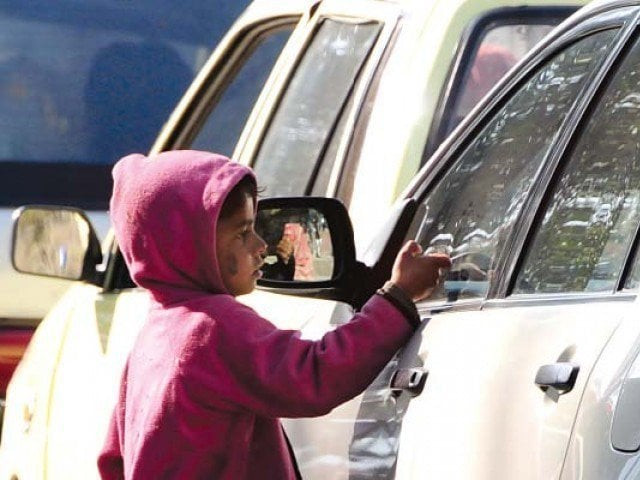Sindh decides to ban child beggary
Social Welfare Department directed to launch special drive for the cause

PHOTO: EXPRESS
Sindh Chief Minister (CM) Syed Murad Ali Shah presided over the cabinet meeting at the Sindh Secretariat on Tuesday. The meeting was attended by all provincial ministers and special invitations were given to the advisors of the CM and the special assistants. The Sindh Chief Secretary Mumtaz Shah conducted the meeting.
The meeting discussed the progress reports on fixation of issue price of wheat crop 2018, existing legal provision on beggary, tariff differential subsidy to new Captive Power Plants, constitution of Governing body of Sehwan Development Authority, Amendment in Sindh Zakat & Ushr Act, and power of the provincial cabinet meeting in financial matters. Presentation on the water position was also given to the cabinet as an additional item.
Pakistan's urban-rural gap widens as poverty rises: World Bank
In the beginning of the meeting, the CM and members of the cabinet expressed grief over the death of two innocent children reportedly due to consumption of poisonous food. The CM directed the chief secretary to strengthen the food authority and start inspection of all food outlets.
The CM Advisor on Law and Information Murtaza Wahab presented the findings of his committee on the issue of beggary on September 3, 2018. The report said that there were enough laws available to deal with the issue such as Section 7 of the West Pakistan Vagrancy Ordinance 1958 that prohibits beggary.
The report also said that the 'beggars' have also been seen with children who they use to create empathy in the givers' eyes. This is a violation of Section 49 of Sindh Child Act 1955. The report also pointed out that in 2011, the Sindh assembly had passed the Sindh Child Protection Authority Act 2011 which called for ensuring the rights of the children in need of special measures and to provide matters ancillary thereto.
Shah, in consultation with the cabinet, decided to ban beggary all over Sindh. He directed the Social Welfare department to launch a special drive against child beggary.
Shah directed the district administration and the police to help the Social Welfare Department in the drive and round up the child beggars and send them to Sweet Home and Street Children Centre, Korangi, where they would be rehabilitated. "I want to provide them shelter, food, sports activities and education so that they could be made useful citizens of the country," he said.
He also directed the Social Welfare Department to make Child Protection Authority an effective organisation. "Helpline 1121 must be projected in the media so that the common man could complain wherever the rights of a child are seen to be compromised," he said and added in the next phase another effective and vigorous drive would be launched against beggary. "I don't want to see any child stretching his hand for beggary at the signals and in the streets," he said.
It was pointed out that Street Children Centre, Korangi was at the completion stage. The chief minister directed Minister Works & Services Nasir Shah to get it completed on war footings. Till then, the picked up beggar children would be sent to Sweet Home.
Wheat price
The Sindh Cabinet also decided to dispose off its wheat stocks of 1,745,815 tonnes at a release price of Rs3,315 per 100 kilogrammes jute bag and Rs3,250 polypropylene (PP) bag, which would place a Rs6.7 billion financial burden due to subsidy on the provincial exchequer.
Subsidy to SNCPP
The cabinet also discussed tariff differential subsidy to Sindh New Captive Power Plants (SNCPP). The cabinet was informed that the government has received the claims of six SNCPPs amounting to Rs2.3b. The chief minister said that these six SNCPPs were located in rural areas such as Dadu, Shikarpur, Thatta and others generating 103.7 megawatts of power. On talking about the impact it has made in the small districts' load shedding issue, the Energy Minister Imtiaz Shaikh said that there was no such apparatus to assess their impact. The power they were generating was being fed into the national grid, therefore its impact assessment was quite difficult. The chief minister directed the minister to make arrangements to assess the impact on local load-shedding and report him.
Human rights education must be made part of police training
Water shortage
The Special Assistant to Chief Minister on water Ashfaq Memon informed the cabinet that 38% shortage of irrigation water for current Rabi has been declared by Indus River System Authority (IRSA). There were apprehensions of increase in the shortage.
The cabinet decided that comparatively higher supplies for sowing of wheat crop during months of November and December 2018. The supplies were to be kept at minimum during last ten days of December to the end of January taking advantage of closures to have water saved for watering crops February onwards. The supply of water in the canals, branches, distributaries and minors would be made as per rotation plans prepared by the concerned regions. Provision of water for drinking purpose needs to be ensured regularly.
The cabinet also approved amendment in the Zakat & Ushr Law under which Karachi has been declared as the city of six districts based on which the distribution could be made according.
Published in The Express Tribune, November 14th, 2018.



















COMMENTS
Comments are moderated and generally will be posted if they are on-topic and not abusive.
For more information, please see our Comments FAQ